#government surveillance
Text
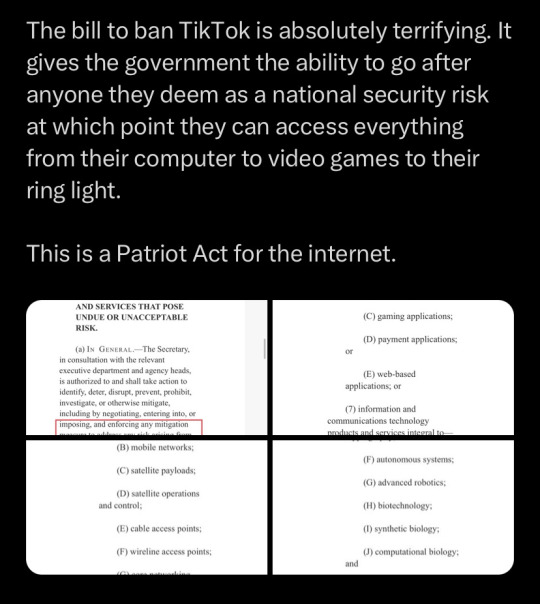
Hello, hey, hi down here! This tiktok ban concerns you too because it’s not a “tiktok ban” congress is pushing, it’s CENSORSHIP! You know? That thing you guys post about here every day?
You don’t think your cute little fics are next or anything deemed “inappropriate?” Think again. They will have the right to control your access anytime for any reason.
“Oh but I’m not American, it’s not my problem.” Plenty of countries are already expressing interest in similar policies! If America gets this, you better believe you’re next and it’ll be an even easier fight! This matters! Banning of any material online will ALWAYS be your problem. Because if it’s tiktok, you think they’re gonna let Discord go? Twitch? Reddit? One by one they’ll remove any competition or threat to Facebook Meta.
#restrict act#government surveillance#tiktok ban#censorship#social media#tiktok#instagram#facebook#twitter
2K notes
·
View notes
Text
The phones in our hands are an incredible asset as well as a devastating liability. We need to reassess our relationship with technology and be more intentional with how we approach its use. The access to information they offer is not one way—we are accessed too.
24 notes
·
View notes
Text
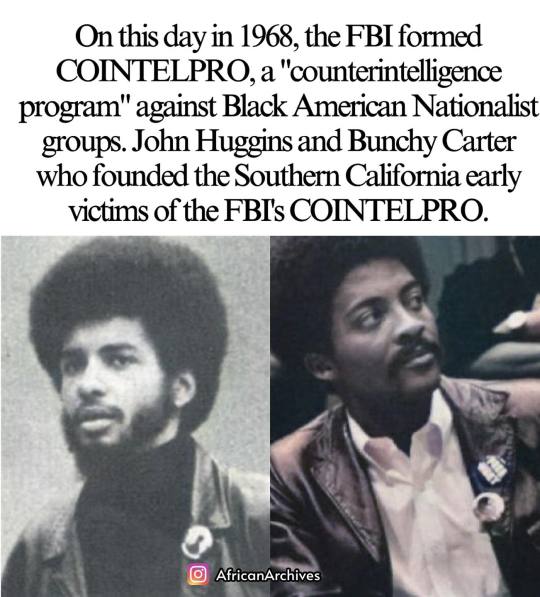
An FBI memo dated November 29, 1968 described a letter that the L.A FBI office intended to mail to the Black Panther Party office. The letter. was made to appear as if it had come from the Us Organization, describing fictitious plans by Us to ambush BPP. The FBI memo stated that "It is hoped this counterintelligence measure will result in an 'Us' and BPP vendetta."
—At a Black Student Union meeting at UCLA's Campbell Hall on January 17, 1969, Bunchy and John, another BPP member, were heard making derogatory comments about Karenga, the founder of Organization Us. Other versions mention a heated argument between Organization Us members and Panther Elaine Brown. An altercation ensued during which Carter and Huggins were shot to death. BPP members originally insisted that the event was a planned assassination, claiming that there was a prior agreement that no guns would be brought to the meeting, that BPP members were not armed, and that Organization Us members were.
Organization Us members maintained the meeting was a spontaneous event. Former BPP deputy minister of defense Geronimo Pratt, Carter’s head of security at the time, later stated that rather than a conspiracy, the UCLA incident was a spontaneous shootout. The person who allegedly shot Carter and Huggins, Claude Hubert, was never found.
During the Church Committee hearings in 1975, evidence came to light that under the COINTELPRO actions, FBI agents had deliberately fanned flames of division and enmity between the BPP and Org US. Death threats and humiliating cartoons created by the FBI were sent to each group, made to look as if they originated with the other group, with the explicit intention of inciting deadly violence
Following the UCLA incident, brothers George and Larry Stiner and Donald Hawkins turned themselves in to the police, who had issued warrants for their arrests. They were convicted for conspiracy to commit murder and two counts of second-degree murder, based on testimony given by BPP members. The Stiner brothers both received life sentences and Hawkins served time in California’s Youth Authority Detention.
#COINTELPRO#FBI manipulation#Black Panther Party#Organization Us#UCLA incident#political assassinations#racial tensions#government surveillance#counterintelligence operations#Church Committee hearings#law enforcement misconduct#conspiracy theories#historical injustice#racism#white supremacy
9 notes
·
View notes
Text
This should be on everyone's radar
New legislative articles, introduced in recent closed-door meetings and not yet public, envision that all web browsers distributed in Europe will be required to trust the certificate authorities and cryptographic keys selected by EU governments.
These changes radically expand the capability of EU governments to surveil their citizens by ensuring cryptographic keys under government control can be used to intercept encrypted web traffic across the EU.
EU citizens need not only be concerned with their own governments, but are forced to place their online security in the hands of every member state and recognised third party country, each of whom can individually act in order to intercept their traffic.
If you’re a European citizen, you can write to the member of the European Parliament responsible for the eIDAS file - Romana JERKOVIĆ - and register your concern.
If you’re a cybersecurity expert, researcher or represent an NGO, consider signing the open letter at https://eidas-open-letter.org.
^
The ramifications extend beyond free speech, censorship, social justice organizing, activism.
#fascism#government surveillance#activism#protest#social justice#police state#antifa#politics#government#EU#internet#privacy#security#2023
9 notes
·
View notes
Text
Elon Musk Fought Government Surveillance — While Profiting Off Government Surveillance | Musk made hay of his legal battle against secret surveillance but continued selling X user data to a company that facilitates government monitoring.
#surveillance#anti surveillance#privacy#invasion of privacy#government#government surveillance#twitter#x#elon musk#elongated muskrat#elon twitter#elongated man#fuck elon#elon mask#elon musty#elonmusk#anti elon musk#social networks#social media#bigot#republican hypocrisy#liberal hypocrisy#hypocrite#gop hypocrisy#class war#spacex#space x#teslamodely#teslamotors#teslacars
3 notes
·
View notes
Text
Google's true origin partly lies in CIA and NSA research grants for mass surveillance
https://qz.com/1145669/googles-true-origin-partly-lies-in-cia-and-nsa-research-grants-for-mass-surveillance
I thought I'd remind people of this old article from 2017 on the CIA/NSA origins of Google and how it was specifically designed to make the tracking and surveiling of internet users as easy as possible.
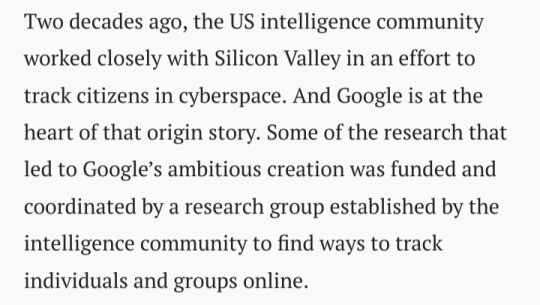
From its very inception, the programs and capabilities that make Google such a powerful search engine were created using CIA/NSA research funds passed along through unclassified NSF (National Science Foundation) grants to develop the technologies necessary to closely track American citizens and foreign users of the internet. Even the internet itself was created as part of a DARPA research program.

So should it come as a surprise to anyone that Google is filled with US and NATO propaganda today? Now I know that's not what this article is specifically referring to, however I think it's a continuation of the same kind of processes for surveillance and information space control between tech giants like Google and the CIA.
An example of what I mean would be any attempts search Google about its record of displaying Western propaganda. You can make the search as specific as possible, specifically referencing US and NATO propaganda or even specific incidents, but your search results will always display endless articles about how Google is supposedly filled with Chinese and Russian propaganda. No mention at all of US or NATO propaganda, even though I can name probably a dozen or so articles I've read over the years about just that. None of them show. Just the articles about how Chinese and Russian propaganda are proliferating online.
Yet, when I search for any kind of contested incidents where it's generally accepted that no one knows whether the incident was caused by Russia or the US, only the articles with the US Govt narrative will show. Again, even though I know of at least a few specific English-language articles about the issue from the Russian perspective. Those articles cannot be found in a simple search and I must go to the source site to find the articles. Only the US government narrative shows on Google.
And you can repeat this pattern for various contentious issues where the US Govt's propaganda dominates search engines like Google and alternative views must be sought directly from their source sites.
So it should come as no surprise that Google itself was created thanks to CIA/NSA grants passed along through the NSF. Similar to how the CIA/NSA passes along grants to promote Western Propaganda outlets in foreign countries using the National Endowment For Democracy or the NED.
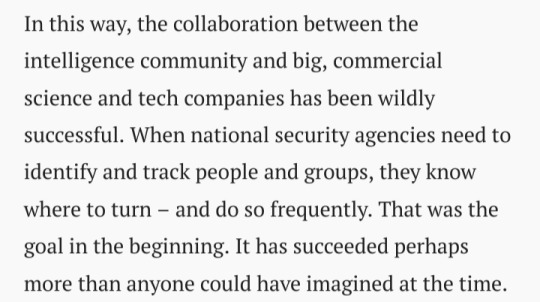
#google and the cia#google propaganda#cia#nsa#national security#government surveillance#govt surveillance#us news#us hegemony#us imperialism#imperialism#the Patriot act#patriot act#surveillance#socialism#communism#marxism leninism#socialist politics#socialist news#socialist worker#socialist#communist#marxism#marxist leninist#progressive politics#politics#us surveillance#fuck the cia#us propaganda#propaganda
18 notes
·
View notes
Text
By Jake Johnson
Common Dreams
April 16, 2024
"Make no mistake," said one expert, "the day will come when there is a president in the White House who will not hesitate to make full use of the Orwellian power this bill provides."
With the U.S. Senate poised to vote later this week on legislation to reauthorize a heavily abused warrantless surveillance authority, privacy advocates are ramping up pressure on lawmakers to remove a provision that would force a wide range of businesses and individuals to take part in government spying operations.
Dubbed the "Make Everyone a Spy" provision by one advocacy group, the language was tucked into a House-passed bill that would extend Section 702 of the Foreign Intelligence Surveillance Act (FISA), which allows U.S. agencies to spy on non-citizens located outside of the country without a warrant. Americans' communications have frequently been collected under the spying authority.
The provision that has sparked grave warnings from privacy advocates was spearheaded by the chair of the House Permanent Select Committee on Intelligence, Rep. Mike Turner (R-Ohio), and the panel's ranking member, Rep. Jim Himes (D-Conn.).
While supporters of the provision, including the Biden White House, claim the proposed change to existing law is narrow, civil liberties defenders say it's anything but.
Currently, U.S. agencies can use Section 702 authority to collect the data of non-citizens abroad from electronic communications service providers such as Google, Verizon, and AT&T without a warrant.
The Turner-Himes amendment would significantly expand who could be ordered to cooperate with government surveillance efforts, broadening Section 702 language to encompass "any other service provider who has access to equipment that is being or may be used" to transmit or store electronic communications.
That change, privacy advocates say, would mean grocery stores, laundromats, gyms, barber shops, and other businesses would potentially be conscripted to serve as government spies.
"The Make Everyone a Spy provision is recklessly broad and a threat to democracy itself," Sean Vitka, policy director of Demand Progress, said in a statement Tuesday. "It is simply stunning that the administration and House Intelligence Committee do not have a single answer for how frighteningly broad this provision is."
"You can't create a surveillance state and just hope the government won't take advantage."
The New York Timesexplained Tuesday that after the FISA Court "approves the government's annual requests seeking to renew the program and setting rules for it, the administration sends directives to 'electronic communications service providers' that require them to participate."
In 2022, the Times noted, the FISA Court "sided with an unidentified company that had objected to being compelled to participate in the program because it believed one of its services did not fit the necessary criteria." Unnamed people familiar with the matter told the newspaper that "the judges found that a data center service does not fit the legal definition of an 'electronic communications service provider'"—prompting the bipartisan effort to expand the reach of Section 702.
"While the Department of Justice wants us to believe that this is simply about addressing data centers, that is no justification for exposing cleaning crews, security guards, and untold scores of other Americans to secret Section 702 directives, which are issued without any court review," Vitka said Tuesday. "Receiving one can be a life-changing event, and Jim Himes appears not to have any sense of that. The Senate must stop this provision from advancing."
Elizabeth Goitein, co-director of the Liberty and National Security Program at the Brennan Center for Justice, wrote on social media Tuesday that "it's critical to stop this bill."
"The administration claims it has no intent to use this provision so broadly—and who knows, maybe it doesn't. But the plain language of the bill allows involuntary conscription of much of the private sector for [National Security Agency] surveillance purposes," Goitein wrote. "Make no mistake, the day will come when there is a president in the White House who will not hesitate to make full use of the Orwellian power this bill provides. You can't create a surveillance state and just hope the government won't take advantage."
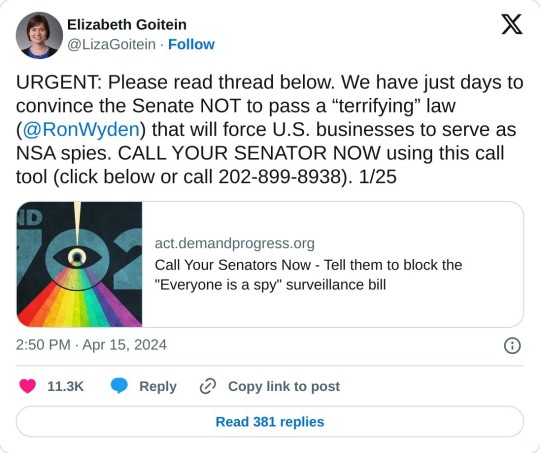
With Section 702 set to expire Friday, Senate Majority Leader Chuck Schumer (D-N.Y.) said in a floor speech Tuesday that he has placed the House-passed FISA legislation on the chamber's calendar and will soon "file cloture on the motion to proceed" to the bill, which is titled the Reforming Intelligence and Securing America Act (RISAA).
"We don't have much time to act," said Schumer. "Democrats and Republicans are going to have to work together to meet the April 19th deadline. If we don't cooperate, FISA will expire, so we must be ready to cooperate."
Sen. Ron Wyden (D-Ore.), a member of the Senate Select Committee on Intelligence and outspoken privacy advocate, has called RISAA's proposed expansion of government surveillance "terrifying" and warned it would "force any American who installs, maintains, or repairs anything that transmits or stores communications to spy on the government's behalf."
According to the Times, Wyden's office has in recent days been circulating "a warning that the provision could be used to conscript someone with access to a journalist's laptop to extract communications between that journalist and a hypothetical foreign source who was targeted for intelligence."
In a social media post on Tuesday, Wyden echoed campaigners in urging people to contact their senators.
"Congress wants to make it easier for the government to spy on you without a warrant," Wyden wrote. "Scared? Me too. Call your senator at (202) 224-3121 before April 19 and tell them to vote NO on expanding warrantless government surveillance under FISA."
2 notes
·
View notes
Text
The Kids Who Hacked The CIA
youtube
#anonymous#hacktivism#hack the planet#anonsec#CIA#edward snowden#government surveillance#internet#James Clapper#Obama#warrantless wiretapping#john brennan#FBI#DOJ#Youtube
2 notes
·
View notes
Text
Watch the new Boy Boy video in collaboration with friendlyjordies. Holy shit watch this video
youtube
3 notes
·
View notes
Link
Ring, Amazon’s perennially controversial and police-friendly surveillance subsidiary, has long defended its cozy relationship with law enforcement by pointing out that cops can only get access to a camera owner’s recordings with [the owner’s] express permission or a court order. But in response to recent questions from Sen. Ed Markey, D-Mass., the company stated that it has provided police with user footage 11 times this year alone without either.
Last month, Markey wrote to Amazon asking it to both clarify Ring’s ever-expanding relationship with American police, who’ve increasingly come to rely on the company’s growing residential surveillance dragnet, and to commit to a raft of policy reforms. In a July 1 response from Brian Huseman, Amazon vice president of public policy, the company declined to permanently agree to any of them, including “Never accept financial contributions from policing agencies,” “Never allow immigration enforcement agencies to request Ring recordings,” and “Never participate in police sting operations.”
Although Ring publicizes its policy of handing over camera footage only if the owner agrees — or if judge signs a search warrant — the company says it also reserves the right to supply police with footage in “emergencies,” defined broadly as “cases involving imminent danger of death or serious physical injury to any person.” Markey had also asked Amazon to clarify what exactly constitutes such an “emergency situation,” and how many times audiovisual surveillance data has been provided under such circumstances. Amazon declined to elaborate on how it defines these emergencies beyond “imminent danger of death or serious physical injury,” stating only that “Ring makes a good-faith determination whether the request meets the well-known standard.” Huseman noted that it has complied with 11 emergency requests this year alone but did not provide details as to what the cases or Ring’s “good-faith determination” entailed.
Matthew Guariglia, a policy analyst with the Electronic Frontier Foundation, told The Intercept he encourages any Ring owners concerned about warrantless access of their cameras to enable end-to-end encryption — an option the company declined to make the default setting after being urged to do so by Markey. “I am disturbed that Ring continues to offer, in any situation, warrantless footage from user’s devices despite the fact that once again, police are not the customers for Ring; the people who buy the devices are the customers,” said Guariglia.
Guariglia added that even though the “emergency” exception hypothetically might be warranted in the most dire circumstances, there will always be the risks of “mission creep” and police abuse without any meaningful oversight. “If there is the infrastructure, if there is the channel by which police can request footage without a warrant or consent of the user, under what circumstances they get it is out of our control. I worry that because it’s decided by the police and by somebody at Ring, there will be temptation to use that for increasingly less urgent situations.”
In a statement to The Intercept, Markey said that he believed Amazon and Ring have both lost the benefit of the doubt, despite their purported good-faith efforts. “I’m deeply concerned to learn that the company has repeatedly disclosed users’ recordings to law enforcement without requiring the users’ permission,” the senator added. “This revelation is particularly troubling given that the company has previously admitted to having no policies that restrict how law enforcement can use Ring users’ footage, no data security requirements for law enforcement entities that have users’ footage, and no policies that prohibit law enforcement officers from keeping Ring users’ footage forever.”
#article#full article#bolding mine#amazon#ring#police#police surveillance#ring camera#surveillance state#government surveillance#information security
43 notes
·
View notes
Text
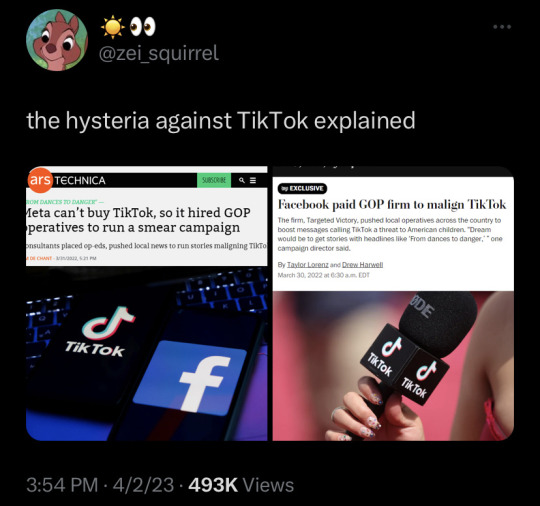
Take this with a grain of salt but if you’re hating tiktok really ask yourself where your assumptions and judgements are coming from. 👀
There is always a chance this is wrong, but there’s also a valid reason to question how involved Zuckerburg is in censoring the internet.
7 notes
·
View notes
Text

Camouflage of a different tier in Hong Kong - a projector that displays a different face than yours to fool cameras and save social score.
2 notes
·
View notes
Quote
Always watching, the Metropolitan Police Department (MPD) uses Closed Circuit TV (CCTV) cameras throughout the District to surveil our communities around the clock. MPD deploys two and a half times as many cameras in communities of color as they do in whiter neighborhoods. This saturation of cameras increases the possibility of a harmful interaction with police, as has often been the case with Black, Latine, and trans sex workers. And even though the cameras ensure that they are rarely out of sight and remain directly underneath the District’s microscopes of CCTV, sex workers are being assaulted, robbed, and murdered. These workers know the cameras are not there to protect them.
Tamika Spellman and Loreal Hawk at ACLU District of Columbia. What Sex Workers Teach Us About CCTV Cameras And Publick Safety
7 notes
·
View notes
Text
Nearly a Third of Gen Z Favors the Government Installing Surveillance Cameras in Homes
George Orwell’s 1984 is one of our society’s most frequently referenced illustrations of what life would be like under an authoritarian government. Actual government policies that are viewed as illiberal in varying degrees are often tied to this novel by opponents, an easy and effective way to call out government overreach and control. In the book 1984, citizens of the fictional nation Oceania are under constant government surveillance, including in their own homes. Devices called telescreens display propaganda and record peoples’ actions, allowing the government to monitor people even in what should be the most private place they know—their homes. This type of behavior is meant to be an extreme example of what can happen when a government gains too much power, and opposition to such surveillance has been assumed to be overwhelming and obvious. But is it?
In a newly released Cato Institute 2023 Central Bank Digital Currency National Survey of 2,000 Americans, we asked respondents whether they “favor or oppose the government installing surveillance cameras in every household to reduce domestic violence, abuse, and other illegal activity.” Not surprisingly, few Americans—only 14 percent—support this idea. Three‐fourths (75 percent) would oppose government surveillance cameras in homes, including 68 percent who “strongly oppose,” while 10% don’t have an opinion either way.
3 in 4 Americans oppose installing government surveillance cameras in all homes
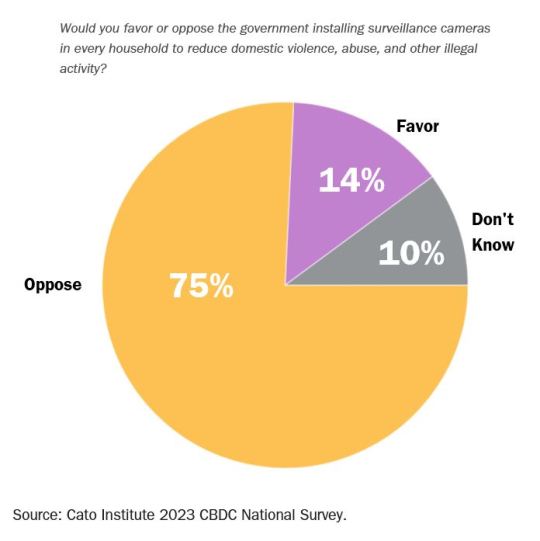
However, Americans under the age of 30 stand out when it comes to 1984‐style in‐home government surveillance cameras. 3 in 10 (29 percent) Americans under 30 favor “the government installing surveillance cameras in every household” in order to “reduce domestic violence, abuse, and other illegal activity.” Support declines with age, dropping to 20 percent among 30–44 year olds and dropping considerably to 6 percent among those over the age of 45.
3 in 10 young Americans support government surveillance cameras in every household to reduce abuse and crime

We don’t know how much of this preference for security over privacy or freedom is something unique to this generation (a cohort effect) or simply the result of youth (age effect). However, there is reason to think part of this is generational. Americans over age 45 have vastly different attitudes on in‐home surveillance cameras than those who are younger. These Americans were born in or before 1978. Thus the very youngest were at least 11 before the Berlin Wall fell. Being raised during the Cold War amidst regular news reports of the Soviet Union surveilling their own people may have demonstrated to Americans the dangers of giving the government too much power to monitor people. Young people today are less exposed to these types of examples and thus less aware of the dangers of expansive government power.
It is also possible that increased support for government surveillance among the young has common roots with what Greg Lukianoff and Jonathan Haidt describe in the Coddling of the American Mind: young people seem more willing to prioritize safety (from possible violence or hurtful words) over ensuring robust freedom (from government surveillance or to speak freely).
Younger Americans, minorities, and the center-left are more open to in-home surveillance cameras
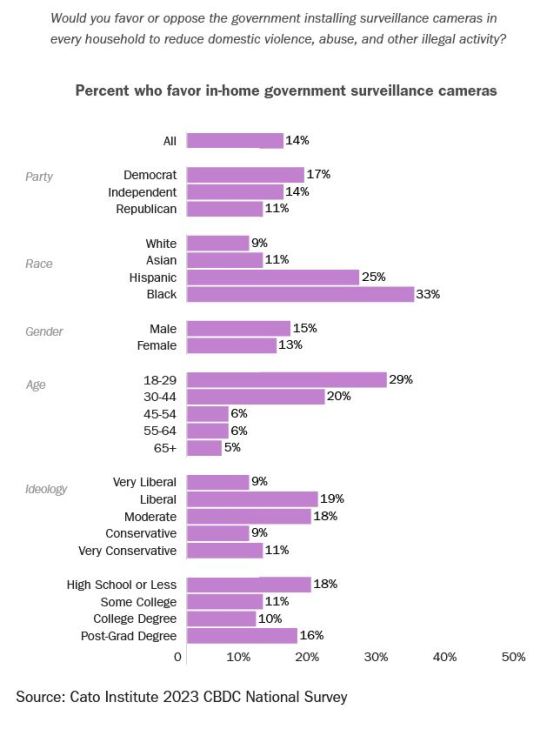
Other demographics also differ in their tolerance of government surveillance in their homes. African Americans (33 percent) and Hispanic Americans (25 percent) are more likely than White Americans (9 percent) and Asian Americans (11 percent) to support in‐home government surveillance. Democrats (17 percent) are also more likely than Republicans (11 percent) to support it but not by a wide margin. This issue divides Democrats between those who identify as “very liberal” in which only 9 percent support and “liberal” who are more than twice as likely to support (19 percent). Notably the issue doesn’t divide men (15 percent) and women (13 percent) who were about equally likely to support.
We asked this question as part of our survey on Central Bank Digital Currencies (CBDCs) in order to see whether there is a relationship between opinions on the government issuing a central bank digital currency and government installing cameras in homes. It appears that the two opinions are correlated. Interestingly, more than half (53 percent) of those who support the United States adopting a CBDC are also supportive of government surveillance cameras in homes, while only 2 percent of those who oppose a CBDC feel the same. This suggests there may be a common consideration that is prompted by both issues. Likely, it has to do with willingness to give up privacy in hopes of greater security.
More than half of those who support a CBDC also support in-home government surveillance cameras

It is important to emphasize that the overwhelming majority of Americans across demographic groups oppose the government surveilling people in their homes. Nevertheless, it is relevant to note the higher acceptance among younger generations to trade freedom and privacy for some added security and protection.
If these trends continue, the United States may confront a very different privacy landscape in the future. It is possible that at some point, the American public will be open to extreme government overreach in a world that feels scarier and more dangerous than before, whether or not it is. Thus, it is important to impart the learnings of the past (and present) about what can happen when government amasses too much power. Without explicitly telling younger generations about the risks and dangers of government surveillance they will forget these lessons and may find themselves repeating devastating mistakes of the past.
#article#government surveillance#surveilance#surveillance state#civil rights#gen z#fascism#authoritarianism
2 notes
·
View notes
Text
I wonder what my government file(s) look like.
In East Germany, the Stasi surveiled and kept files on every single citizen, over 16 million of them, an Orwellian police state on a shoestring budget that still managed to be the most in-depth "intelligence agency" of the 20th century. Now imagine they had infinite resources and 21st century technology, the internet, cell phones, facial recognition, and you can begin to picture the horror shows underlying the United States government. You KNOW they have files on you, and you KNOW they're as thick as textbooks. In Germany today all the Stasi files are public information, so Germans can look themselves up and see what the secret police had on them, but America will take these secrets to the grave. If the country ever collapses, I guarantee you that goons in suits would sooner fry servers and burn files than admit the extent of the government's invasion of our privacy. Best case scenario, our files will be classified for centuries long after we're all dead, so only future historians will know how much worse things are today than we can even begin to imagine.
#government surveillance#surveilance#no privacy#privacy#orwellian#police state#surveillance state#east germany#stasi#ministry for state security#secret police#files#cia#fbi#nsa#lmnop#ymca#asdf#cwm fjord bank glyphs vext quiz
21 notes
·
View notes
Text
Surveillance State: Inside Israel's Monitoring of Palestinians
youtube
From facial recognition to biometric databases, Israel's advanced surveillance technologies have turned the occupied Palestinian territories into a dystopian "smart city" where every movement is monitored and controlled. Here are three advanced surveillance technologies used by Israel to monitor Palestinians.
0 notes